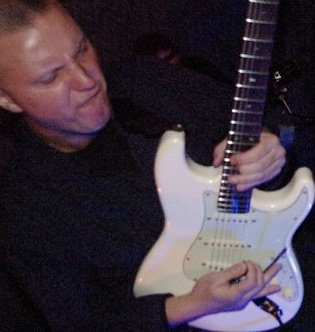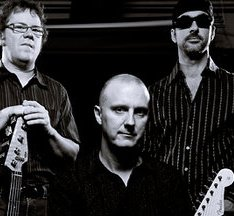 Leddie Jackson has come back from the dead to play guitar. Jackson, currently ripping up on guitar in southern New Hampshire, has been a fixture in Boston and Worcester music circles for years. He had a medical condition that killed him, briefly, before he was brought back to life in an ambulance. Now on his ninth life, he’s making a play toward expanding his career.
Leddie Jackson has come back from the dead to play guitar. Jackson, currently ripping up on guitar in southern New Hampshire, has been a fixture in Boston and Worcester music circles for years. He had a medical condition that killed him, briefly, before he was brought back to life in an ambulance. Now on his ninth life, he’s making a play toward expanding his career.
“I’ve been at this for quite a while, off and on,” he said, “and moved down to the Boston area and did some stuff there and Worcester, and I’ve also worked in high tech, and most of the relocating I did had to do with being near jobs. I came back to southern New Hampshire in the late 1990s.”
Jackson got started in the New Hampshire music scene once again when he suddenly had to face the biggest challenge of his life. He developed health issues that requited spine surgery which lead to paralysis in his right arm, leaving him unable to play for about five years. Proper diagnoses didn’t happen for sometime either.
Six months after surgery Jackson just started playing again. “I had to make a lot of adjustments to my playing style,” he said. “I just kept at it and have slowly but surely worked back to wherever it is I am right now, doing shows and recordings. I don’t know if I’ll ever be the same as I was. But I do have a lot of fun now. I certainly appreciate it new ways that I didn’t before.”
During the dark days, someone important in Jackson’s life helped him pull himself out of the misery. “My lovely girlfriend, Christine, is the one who got me going again after the surgery,” Jackson said. “I couldn’t write. I couldn’t play. I lost an enormous amount of weight. I was very ill. I was revived in an ambulance. It got really bad.”
During a long car ride Christine had asked him to play his older music on the dashboard stereo. Rehearsals and live shows became the soundtrack of their road trip.
“It all sounded a lot better than I thought it would,’ he said. “I was preparing to wince and be embarrassed and laugh at how terrible it was. It surprised me that it sounded a lot better than I thought it would. Secondly, Christine was shocked, and really thought I should find some way of getting back into music. I love her so much. She was amazing. She bought me keyboards. She helped me get guitars. She helped me figure out how to use the tremolo bar. She doesn’t know anything about music. To her, it was like, ‘Well, what if you put that thing back in and hold onto that.’”
Today, Jackson still deals with the aftermath of his illness and surgery. “I don’t want to give the false impression that it was like an open and shut thing, getting your appendix out and it’s over with. The plates and screws are still in my back. There’s still pressure on my spine. I still have vascular damage in my arms.” But, he has emerged from the period of musical inactivity that lasted over five years.
Jackson had to innovate a new way to pick the strings. The problem his illness left him with made his right hand unable to feel the pick stroke the same way. His hand now has a strange habit of lifting away from the body of the guitar when he plays. That was making him miss the string when he’s picking.
“If I just left the tremolo bar in the Stratocaster, I could hold onto that with a couple of fingers, like my pinky finger and my ring finger on my picking hand, and then use the rest of my fingers to pick notes,” he said. “The bar actually provides a leash to keep my hand close enough to the strings.” Unfortunately, Jackson cannot get around his problem on acoustic guitar.
Jackson then decided that since he was on his ninth life, he would try music once more. Getting no responses to his ads in New Hampshire, the guitarist had to link up with Worcester musicians like drummer Kent Byron and bass player Bryan Barstow. Soon, the new trio was playing Jeff Beck’s “Lead Boots.” Yet, gigging wouldn’t work for a band that was divided between a Worcester based rhythm section and a New Hampshire guitarist.
Back in the Granite State, Jackson formed his Drifting Song trio with bass player Ted Sirois and drummer Carlo Carluccio. Drifting Son’s first gig was last August, with quite a few since, and they play two shows this month of March 2011. Jackson is hoping to go into the studio as a trio in the coming weeks. The guitarist enjoys working with these rhythm section guys because they respect his material. Jackson, likewise, respects their creative decisions. “They’re very patient with me,” Jackson said.
Drifting Son are in rotation at Milly’s Tavern and Mad Dog Saloon in Manchester. Jackson is looking to break into new rooms at this point. He wants to get Drifting Son into Brick House in Dover, New Hampshire before heading out to the originals-friendly clubs in Worcester. “I guess the market will tell me what it likes,” Jackson said.
Jackson wrote all of the songs on Drifting Son’s page on ReverbNation. His tunes are all based on real events in Jackson’s life. “Pushing Tin” is about being in a bad relationship and hoping the coal will turn into diamond: “It’s hard to take/But love is made to break/You can’t push tin into gold.”
Jackson, who has been in the business 20 years, is almost completely self-taught. He has very rarely worked in cover bands. He wrote his first song on the Christmas day he got his first guitar, sitting in his family’s living room, while tuning up.
“My playing style comes from playing all the wrong notes first and then weeding them out one at a time,” Jackson quipped. “If you want to write, that’s the right thing to do. If you want to be a writer, you need to learn how to use the instrument to express whatever it is you’re feeling as opposed to have something mapped out on paper.”
Jackson compares the musician who writes his own music to an explorer, someone who travels off the map and does not know what he is going find, but he decides at any given moment which directions he’s going to head, and then he deals with whatever he encounters and adjusts if necessary and continues.
Jimmy Page has been Jackson’s first guitar hero since age three. A relative put headphones on toddler Jackson and put Led Zeppelin’s first album on. “I went absolutely berserk,” Jackson said. “That’s where the nickname Leddie kind of stems from.”
After he went through an obsession with all things Jimmy Page, he moved onto Jimi Hendrix. As an older player he fell in love with the music of Django Reinhardt, Uli Roth, Yngwie Malmsteen, and his very favorite musician Victor Wooten, former bass player for Bela Fleck and the Flecktones.
“His gift for interpreting melody on the spur of the moment and reaching people inside is really almost scary to witness and experience. You can be in a crowd of 20,000 people and he will make you feel like he knows what you’re thinking inside and he’s interpreting it and giving it right back to you.”
Jackson grew up in a blue collar family that didn’t appreciate education. His parents didn’t push him much, even though he could, at age three, play along to Aerosmith’s “Seasons Of Wither” and could harmonize with the sound of tires on the pavement outside or to his mother’s vacuum cleaner. He could also pick out notes on the piano.
His family was very poor, and he can still remember powdered milk and having to live with his grandparents. Jackson’s father was in the Navy and they had to relocate to wherever his new port was. Jackson didn’t even have his own room as a child. He had to share a room with his parents and he ate mustard sandwiches because his family couldn’t afford cold cuts.
Jackson’s life was turned around by a music teacher at a private shop in Manchester, New Hampshire. Roland Belisle, now deceased, of Belisle Music Family was the first person to recognize Jackson’s talents. When Jackson was a teenage violin student, Belisle berated Jackson’ parents for not being more supportive of him. “Nobody else ever seemed to care,” Jackson said. “Everything good that happened to me musically after that point was because Roland spoke up.”



